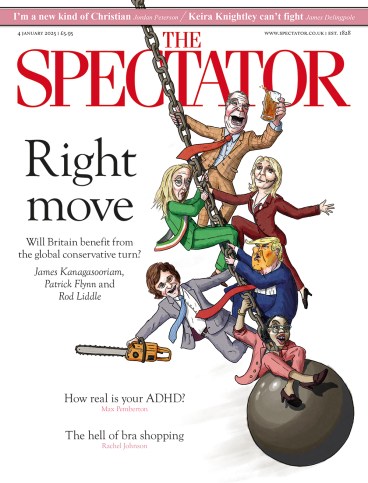
Headed for ‘the worst of all worlds’ is not where any of us would wish to find ourselves at the start of the new year. But that was the phrase used by the CBI economist Alpesh Paleja to sum up the predictions of member businesses – of reduced hiring and output, rising prices and weak growth. Since that survey, a revision to zero of the official growth figure for the third quarter of 2024 and reports of depressed pre- and post-Christmas consumer spending have provoked even darker whispers of a return to recession. Whence cometh such pessimism?
Has it bubbled out of the Tories’ black hole of fiscal shame? Can we blame the Bank of England and the Treasury ‘blob’? Or the rare alignment of planets that’s expected in three weeks’ time? Or ‘Rachel from Accounts’, as City wits now habitually refer to the Chancellor in recognition of the heights of her past banking career?
Let’s face it, no one could claim that Rishi Sunak left a golden economic legacy, even though growth in the last two quarters of his tenure, at 0.7 followed by 0.5 per cent, was relatively robust. Likewise no one holds bouquets for Governor Andrew Bailey of the Bank, even though inflation eventually took the path he predicted and continues to do so, including the current uptick. And of course recent global (rather than celestial) events have been as unhelpful as they so often are.
But the plain truth is that the Prime Minister’s relentlessly downbeat narrative since July, the double-speak of his avowed commitment to growth, the absence of positive policy ideas, and finally Reeves’s anti-enterprise October Budget, have fuelled the frankly-why-bother mood of business reflected in the CBI survey.
If Truss-Kwarteng was an irresponsible car crash that destroyed Tory credibility for a generation, Labour’s first six months has been the economic equivalent of unmanned M25 roadworks causing a huge stationary tailback. Politicians with vision and charisma can make the weather, whatever the circumstances. This lot have merely succeeded in stopping the traffic.
Lost voice
I’m grateful to Charles Handy, the management thinker who has died aged 92, for the concept of the ‘portfolio career’, which has been my enjoyable way of life for the past three decades. Handy also preached the unfashionable gospel (sometimes echoed in this column) of the company as a community of worthwhile human endeavour – in an era when the tide of boardroom opinion was running the other way, towards the primacy of shareholder value and financial engineering.
The result, Handy argued, ‘has not worked for most’: not for the society that endured the 2008 crash, not for workers whose median earnings are no better than a generation earlier, not even for shareholders’ long-term returns. Only top executives have become grossly richer – and in a 2019 interview, Handy proposed that the excessive bonuses they don’t really need and that make them so unpopular should be paid in ‘philanthropic gift tokens’. What a fine but unworldly idea, befitting the son of a rural Irish clergyman that Handy was. And what a shame he was such a voice in the wilderness.
Red on red
In the course of my portfolio career, I once had occasion to ask one Labour politician to make peace with another who was disrupting a non-political project in which we happened to be involved. ‘Can’t do that,’ came the answer. ‘Not in the same faction.’
If I had to make a political prediction for 2025, it would be the rise of faction strife within Labour’s many fiefdoms. An early example is London mayor Sadiq Khan’s ‘red-on-red’ collision with Labour-run Westminster City Council over the redevelopment of Oxford Street. The mayor plans to pedestrianise the central section – overriding a less radical council improvement scheme. If Sadiq’s version might look more cosmopolitan, it can only be achieved by creating nearby traffic chaos. The alternative has doubters too, the borough authority (Tory-led until 2022) having done nothing to reverse a decade-long decline of what was once the capital’s flagship retail boulevard. If Labour’s internecine fight drags on, one side or the other will end up repaving a desolate canyon of candy stores, lost tourists and shoplifting gangs.
Shortage of fizz
My business predictions for 2025 are no less gloomy than the CBI’s: glacially slow progress on regulatory reforms to inject new fizz into City capital markets; a deepening crisis in the automotive industry due to lack of demand for electric cars; growing public anger at the proliferation of giant solar farms on agricultural land; and yet more delays to the completion of the Hinkley Point nuclear power station.
But more cheerfully, and closer to home, here’s a forecast from City AM: ‘Covent Garden is transforming into a foodie destination, shedding its image as a tourist trap. The recent consolidation in the ownership of property in the area should result in a more curated offering.’
It’s true that the £2.5 billon merger of adjoining commercial landlords, Shaftesbury and Capital & Counties, has maintained the stylish tone of my inner-London district. But what drives success for food outlets these days, I observe, is less about frontage and postcode, more about social media impact. Nothing else can explain the pavement-blocking throng around a cramped kiosk called Humble Crumble, selling £6.50 pots of pudding and custard.
Mind you, restaurant publicity also still comes in paparazzi form. I’ve just enjoyed an elegant post-theatre supper of fish stew and champagne at J Sheekey, off St Martin’s Lane, where our editor was snapped before Christmas in an unguarded moment. Did I fancy anything to finish? ‘Is snogging still on the menu?’ I quipped merrily, but my companion frowned. ‘If you’re trying to brighten a dismal new year,’ she said, ‘you’re going to need better jokes than that.’






Comments